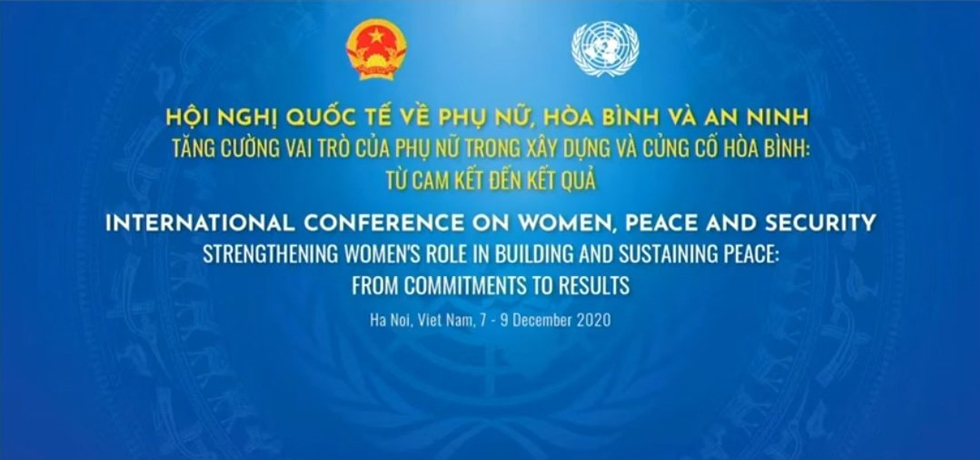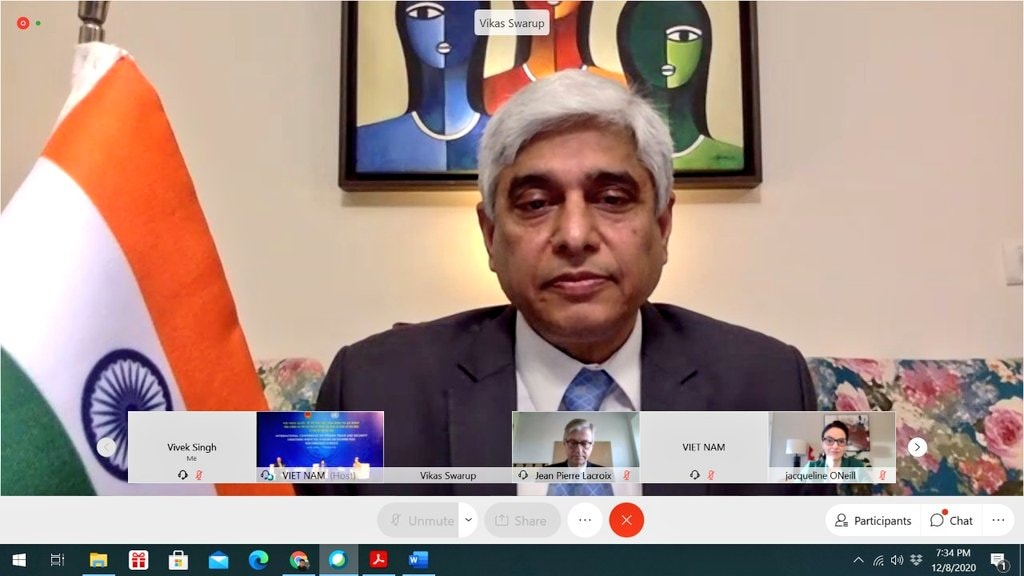
Excellencies,
Distinguished delegates
Ladies and Gentlemen
At the outset, let me take this opportunity to convey the deep gratitude of the Indian delegation to the Socialist Republic of Viet Nam for inviting me to deliver the keynote address on this very important topic.
India has a long and distinguished history of service in UN peacekeeping, having contributed more personnel than any other country. To date, more than 250,000 Indians have served in 50 of the 71 UN peacekeeping missions established around the world since 1948. Currently, there are about 5,500 troops and police personnel from India who have been deployed to UN peacekeeping missions. A total of 171 Indian peacekeepers, more than any other Member State, have paid the ultimate price while serving with the United Nations.
Excellencies,
2020 marks the 20th anniversary of the adoption of United Nations Security Council Resolution 1325 on Women, Peace and Security, a ground-breaking resolution that recognized women’s leadership to achieve international peace and security and their contributions to conflict prevention, peacekeeping, conflict resolution and peacebuilding.
As we all know from experience, women suffer the most in any conflict situation. Obviously, more women in peacekeeping means more effective peacekeeping. Women peacekeepers have greater access to communities, help in protection of the most vulnerable, and inspire other women to play a meaningful part in peace and political processes. Research reports have pointed out that peace agreements are 35% more likely to last at least 15 years when women are at the table.
Women peacekeepers are essential enablers to build trust and confidence with local communities and help improve access and support for local women. Women are also suited better to address the disproportionately negative effect that conflict has on the livelihood of women and bring new perspectives and solutions to the table by effectively addressing the needs of women and children in conflict and post-conflict settings.
Excellencies,
India’s contribution to the strong and positive engagement of UN with the countries facing or recovering from prolonged conflicts through deployment of uniformed women contingent goes back to 1960 when women of the Indian Armed Forces Medical Services headed to ONUC or the UN Peacekeeping mission in the Republic of Congo to assist with the setting up of a 400-bed hospital.
In 2007, India created history by deploying the first ever all-female Formed Police Unit (FPU) for UN Peacekeeping in Liberia. This unit served in Liberia for a decade and through their work managed criminality, deterred sexual and gender-based violence and helped rebuild safety and confidence among the local population and served as an example of how the deployment of more female uniformed personnel can help the UN in its efforts to combat sexual exploitation and abuse. The Indian FPU led to deep and long lasting positive impacts on Liberian society. During the farewell of Indian FPU, the then President of Liberia underlined the contribution of the force in "inspiring Liberian women, imparting in them the spirit of professionalism and encouraging them to join operations that protect the nation”. You would be surprised to know that during the tenure of Indian FPU:
• The number of women applying to join the Liberia National Police (LNP) tripled from approximately 120 to 350 within two months of the arrival of Indian FPU
• The number of women enrolled at police academy shot up from four per class to 30 per class in 2007 and 100 per class in 2008 and 2009.
• Female representation in Liberian Security Services grew from 10% to 17%.
Women peacekeepers obviously serve as powerful mentors and role models for women and girls in post-conflict settings in the host community, being examples for them to advocate for their own rights and pursue non‐traditional careers.
Earlier this year, on 29th May or the International Day of UN Peacekeepers, Secretary-General Guterres lauded the achievements of Indian Army officer Major Suman Gawani, who was awarded the UN Military Gender Advocate of the year for 2019 for her role as a peacekeeper with the UN Mission in South Sudan (UNMISS).
Major Gawani was the principal focal point of contact for gender issues for military observers in the mission. The officer encouraged participation in joint military patrols to maintain gender balance, irrespective of the hardships under extreme field conditions. Apart from supporting the UNMISS force initiatives, she also trained the South Sudan government forces on conflict-related sexual violence aspects.
 Excellencies,
Excellencies,
India has been an active participant in the deliberations on issues focusing on women empowerment and gender mainstreaming at various UN bodies. During the past two decades, the normative frameworks on Women, Peace and Security have been strengthened considerably. Today, there is a greater awareness about the centrality of meaningful participation of women in UN’s peace and security efforts including peacekeeping.
In the "Declaration of Shared Commitments on UN Peacekeeping Operations” under Action for Peacekeeping (A4P), Member States agreed to collectively commit to implement the Women, Peace and Security agenda and its priorities by ensuring full, equal and meaningful participation of women in all stages of the peace process. They further recommitted to increasing the number of civilian and uniformed women in peacekeeping at all levels and in key positions.
India welcomes the recently launched "Uniformed Gender Parity Strategy” and sees it as a collective commitment towards implementing A4P. The Uniformed Gender Parity Strategy, which was adopted in 2018, has given clear targets to achieve enhanced participation of women personnel at various categories. India is committed to increasing the number of women peacekeepers and to meeting the targets in this regard within the specified timelines. In order to fulfill its commitments, India has already deployed a Female Engagement Team at the Democratic Republic of the Congo as part of the Rapidly Deployable Battalion in MONUSCO. We have also pledged a Women Formed Police Unit (FPU) under the Peacekeeping Readiness Capability System.
While we fully welcome the initiatives by the UN Secretariat in driving the formulation of policy frameworks to increase the number of women peacekeepers, we notice that to accommodate countries who cannot fulfill all-women unit commitments, the policy frameworks have been diluted to prefer mixed units over full women units. This calls for an approach towards review and greater introspection.
It is our considered view that to achieve the enhanced targets under the Uniformed Gender Parity Strategy, the UN ought to encourage countries that are willing or have already pledged to contribute all-women units.
Excellencies,
Nothing can damage the credibility of UN than instances of Sexual Exploitation and Abuse (SEA) by its own employees.
India fully supports UN Secretary General’s zero-tolerance approach to sexual exploitation and abuse. India was the first country to contribute to the Secretary-General's Trust Fund for Victims of Sexual Exploitation and Abuse and also signed the voluntary compact on SEA with the Secretary-General in 2017. The Indian Prime Minister has joined the "Circle of Leadership” on the prevention of and response to sexual exploitation and abuse in United Nations operations.
India is also funding a project of the Department of Management Strategy, Policy and Compliance called, "Pipeline to Peacekeeping Command Program” (PCP). This project is aimed to develop the capacity of future commanders and managers to lead by example and raise awareness of UN standards of conduct among their personnel.
To conclude, India stands ready to engage with our partners to work towards ensuring the meaningful participation of women and mainstreaming of women, peace and security considerations for building inclusive, peaceful and resilient societies.
Just as a bird cannot fly with one wing, durable peace cannot be achieved without the active participation of women. That is what we must all aim for in moving from commitment to results.
Thank You.
***
https://www.facebook.com/IndiaInVietnam/posts/3629585087107815
https://www.facebook.com/IndiaInVietnam/posts/3630718343661156
https://twitter.com/AmbHanoi/status/1336504308347506688?s=20
https://twitter.com/AmbHanoi/status/1336504309744189442?s=20
https://twitter.com/AmbHanoi/status/1336317804320976898?s=20




 Excellencies,
Excellencies,





